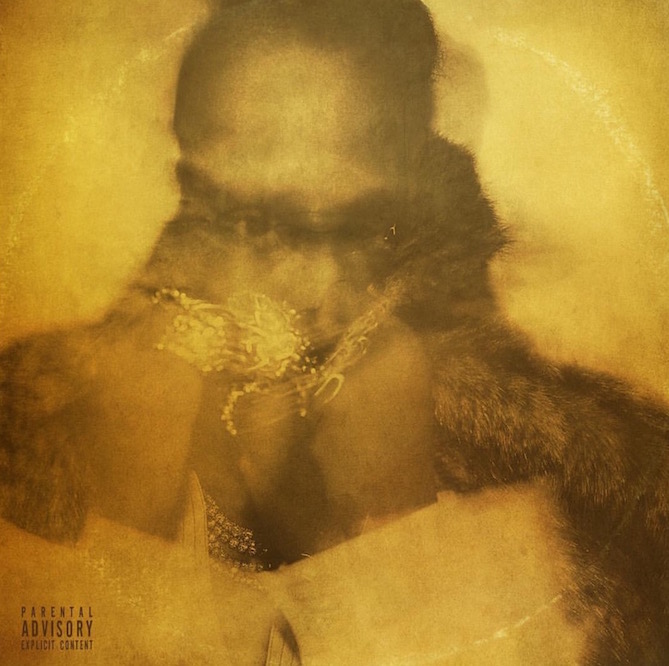One good thing to come from capitalism is rap music, and into the lineage of the art form’s greatest moguls—Master P, Puff Daddy, Jay Z, the guy who started Rap Snacks—we may soon need to enter Future, a rapper’s rapper who, though not a tycoon just yet, has learned to exploit the current economics of rap better than anyone routinely stepping into a booth. Last week he suddenly announced and then dropped a new album, named after himself; counting his collaboration with Drake, it’s the fourth full-length he’s officially released in the last 18 months, and that doesn’t include mixtapes. Rap music long ago turned into a sport that rewards constant productivity, and few MCs in recent history have been as pointedly prolific as Future.
He learned, perhaps, from Gucci Mane, an early mentor of sorts who has released somewhere between 30 and 1,000 projects in his career. In flooding the market with mixtapes, Gucci himself was taking the baton from Lil Wayne (who had gotten it from 50 Cent), but Future has found himself in a unique and chaotic time for the music business. Those artists before him put their songs out for free, hoping to parlay any gathering momentum into what we still then recognized as the normal motions of major label music: singles, videos, CDs wrapped in plastic, etc. In the meantime, rappers—particularly Gucci, who had no presence in the mainstream, or later someone like Kevin Gates—made money through features and by playing shows to fans that may have been a niche concern to executives in corner offices, but who were nonetheless loud, proud, and happy to support music they loved. The cash was there for rappers who were good and savvy enough, but the process was inefficient, and it helped nudge rap music back to the outer edges of pop culture.
At the moment, streaming has smoothed out those inefficiencies. Rappers may still need to perform multiple club dates per week to get anything more than cents on the dollar, but now more than ever, the reward for prolificacy is direct and immediate. If you’re, say, the Migos, Spotify and YouTube may blast one of your songs into a stratosphere previously deemed unreachable, your career riding along with it. If you’re Future, there no longer needs to be a separation between the album and the mixtape. Put a bundle of songs on streaming services and you’ve got yourself a number one album (FUTURE will be his fourth in a row). Where Future’s prolificacy played out on buggy mixtape sites like Datpiff in a previous and recent iteration of his career, it’s now more likely to be backed by Apple.
If the greatest tension in art is when it begins to merge with commerce, then it’s fair to wonder if the reward for Future suddenly releasing an album to streaming services is just too great for him to ignore. This question was, at the very least, the most interesting thing about EVOL, his last album before this one. At a trim 11 tracks, EVOL at first blush seemed like it could be a diversion for the rapper, even a concept album of sorts. (EVOL is “love” spelled backwards). Instead, it presented Future at his most forgettable, with needlessly nihilistic rapping running more or less uninterrupted over dull, monochrome beats. As if to hammer home the feeling that Future’s “albums” were perhaps becoming mere products of convenience, his label belatedly tacked onto the end of EVOL a song, “Wicked,” that had first appeared on Purple Reign, a mixtape released a month prior, but which had become an unexpected, organic hit single.
Conversely, FUTURE is lively and engaging, with production and rapping that feels consciously animated. There is a madcap, almost zany quality to the album, as if Future was looking for an outlet for some of his more goofy ideas. After a generic two-song start that drags a bit, the album perks up with “Zoom,” in which Future chirps at himself over what sounds like a corroded, post-apocalyptic version of the pinging “Country Grammar” beat. “Draco,” an apparent single, is reminiscent of the bleepy landmark “March Madness,” but with that song’s wound-up tension sucked out and replaced with a celebratory, laid-back relaxation. On “High Demand” he accentuates his raps— “I float off Earth, always float off Earth”— with falsetto harmonizing that it feels like he’s using to zoom off into space. “I’m So Groovy,” a hilarious title on its face, has another bouncy beat, and over the top of it Future almost performs a stand up comedy routine, punctuating freely associated punchlines with an exaggerated little hum. “Austin Power / mmhmmm” he trills at one point, and you can picture his lips curling upward in a sort of devilish smile.
These moments of levity peppered across the album are important for a rapper whose material is resoundingly bleak. It’s why the possibly controversial punchline here—“Grab on that pussy like Donald”—lands with a wink, where EVOL’s sour sexual revenge fantasy “In Her Mouth” was noticeably off-putting. Again he mostly raps mostly about empty sex, drug deals, and wanton violence, but neither the sex nor the omnipresence of luxury goods seems to be much of a salve. Even when he raps about enviable opulence, it feels purposefully weaponized, as if he accumulates material wealth to make other people mad, if not necessarily himself happy. “Mask Off,” with its hypnotic flute loop, feels like an instant classic Future song in that he celebrates his lifestyle while also sounding like he’s on the verge of passing out. (“Percocets, molly, Percocets” goes the chorus.)
But there is striking imagery throughout the album, little phrases that stick in your head even after the album plays itself off. “These links on me leaving bruises,” he raps on the morose closer “Feds Did a Sweep.” “I don’t tell lies, I tote Uzis.” On “Mask Off” he paints an entire scene in two bars while also illuminating the complex life of his character within it: “Rick James, 33 chains / Ocean Ave, cruising Biscayne / Top off, that’s a liability / Hit the gas, boosting my adrenaline.” Or on “Zoom”: “I just landed from Japan / Tokyo and Korea / Panamera to the Lear.” This is economic, evocative writing that should be the envy of even rap’s most highly celebrated lyricists.
The album is openly bloated at 17 tracks, a length that feels designed to roll streams up into album sales. But here his commercial and artistic motivations feel aligned. Dropped in our laps from out of nowhere, FUTURE is a clear return to form, wiping away the memory of the dreary EVOL and setting the stage for what could be an extremely, let’s say, lucrative 2017. He is, after all, releasing another new album in two days.





